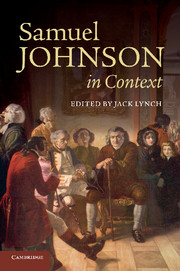Chapter 3 - Correspondence
from Part I - Life and works
Published online by Cambridge University Press: 05 June 2012
Summary
Correspo′ndence, Correspo′ndency. n.s. [from correspond.]
2. Intercourse; reciprocal intelligence.
It happens very oddly, that the pope and I should have the same thought much about the same time: my enemies will be apt to say, that we hold a correspondence together, and act by concert in this matter. Addison’s Guardian, No. 116.
If the impression persists of Johnson as an “épistolier malgré lui,” as Bruce Redford has called him (Letters, 1:ix) – a letter-writer despite himself – Johnson himself is partly to blame. During an age of prolific correspondence, in which letters were usually celebrated for their spontaneity and candor, Johnson instead stressed their tendency to deceive: “There is, indeed, no transaction which offers stronger temptations to fallacy and sophistication than epistolary intercourse” (Lives, 4:58). It is also the case that two Johnsonian monuments have obscured the range and variety of his private correspondence. Two of his most famous letters, the vigorous denunciations of Lord Chesterfield and James Macpherson, are necessarily unrepresentative; they triumphantly declare to the world both the author’s independence and his antagonist’s impudence: “I hope it is no very cinical asperity not to confess obligation where no benefit has been received”; “I will not desist from detecting what I think a cheat, from any fear of the menaces of a Ruffian” (Letters, 1:96; 2:169).
No intelligence is communicated
Around three quarters of Johnson’s surviving correspondence dates from the last twelve years of his life. The usually businesslike notes he sent between his twenties and his fifties give little indication of the late flowering of subtle, teasing, and allusive letters to Hester Thrale and her family, letters which he sensed might one day appear in print. In Rambler 152, he regretted that none of the tribe of writers who “excelled in the art of decorating insignificance” had published their familiar correspondence. The remark about “art” suggests that he valued not so much the frankness as the elegance of letters written about nothing in particular. In works of his own in which “no intelligence is communicated, or business transacted” (Works, 5:44, 47), he enjoyed playing the role of a mock-heroic narrator: “This, Madam,” he wrote with faux solemnity, “is the history of one of my toes” (Letters, 3:186). He told Thrale that “To sit down so often with nothing to say, to say something so often, almost without consciousness of saying, and without any remembrance of having said, is a power of which I will not violate my modesty by boasting, but I do not believe that every body has it” (Letters, 3:89).
- Type
- Chapter
- Information
- Samuel Johnson in Context , pp. 21 - 28Publisher: Cambridge University PressPrint publication year: 2011



